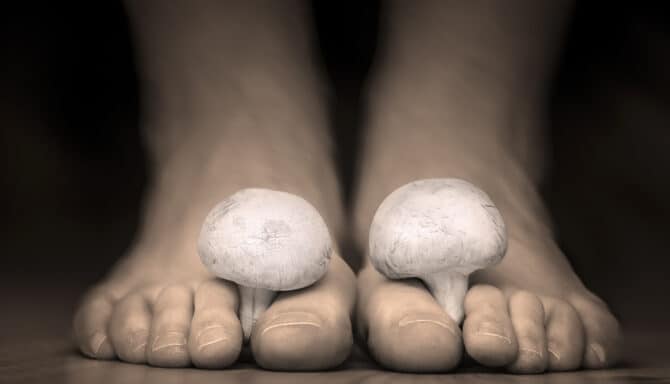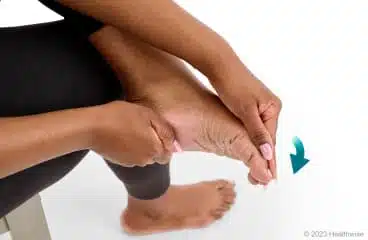Black toenails can be alarming when you notice one, especially since Discoloured toenails, in general, are abnormal. Luckily, most black toenails are not something we need to worry about, and their presence is usually attributed to bruising or bleeding underneath the nail.
That being said, there are some rare instances where black toenails are caused by something more serious, like complications arising from a fungal infection or chronic ingrown toenails. Likewise, we think it’s important to touch on those unlikely, yet urgent, scenarios! We’re here to address any questions you may have about black toenails, including questions about causes, preventative measures, as well as treatment methods.
What Causes Black Toenails?
- Subungual Hematoma: There is a good chance that your black toenail is bruising or bleeding underneath the nail, also known as subungual hematoma. This can occur after Stubbing your toe, or another similar injury that caused breakage in the blood vessels underneath your nail bed. The black colouring throughout your nail is the leakage from the broken blood vessels. Similarly, subungual hematoma can be caused by wearing ill-fitting footwear that consistently wedges your toes together in a toe box that is too small for your feet.
- Ingrown Toenails: In rare cares, the culprit behind your black toenails can be complications resulting from recurring Ingrown toenails. Specifically, there may be black colouring throughout your nail without any known injuries or trauma to the toenail. If this sounds like you, you need to consult a doctor right away. Chronic ingrown toenails can lead to an infection, which in turn can cause necrosis. Necrosis refers to the death of cells or tissues. It is extremely rare, yet can occur if you have Diabetes and low blood circulation in your feet. If you are a diabetic, you should rule out this possibility and see your doctor as soon as possible.
- Fungal Infection / Toenail Fungus: It is possible the discolouration in your nail bed is an accumulation of debris caused by a Fungal infection. In this case, the nail will likely look different from a black toenail caused by subungual hematoma. This is because your toenail will also take on a yellowish colour. The black discolouring will likely not spread throughout the entire nail bed. Nonetheless, it is crucial not to ignore a fungal infection that has progressed this far: Toenail fungus can be very persistent and difficult to treat if you wait – the earlier you start treatment, the better the outcome.
What Treatments Are Available For Black Toenails?
Depending on the cause of your black toenail, there are several ways to treat this condition. There are preventative measures you can take, as well as treatment services from a chiropodist.
- You should be wearing Properly fitted footwear that provides you with a roomy toe box. Your toe box should ideally provide you with 1/2 inch of space between the end of your longest toe and the end of the toe box. If your black toenail is from subungual hematoma, it will be able to heal properly in this environment. Not only that, but a proper toe box will also be key in preventing more black toenails.
- If you have a fungal infection, a Chiropodist can provide you with a topical anti-fungal medication. Over-the-counter products are unlikely to work. You can start routine visits for fungal nail treatment in order to prevent flare-ups and for nail debridement services, as needed.
- Try not to stub your toe! We know that sounds tricky, but it’s an extremely common cause of black toenails. You can avoid being barefoot at home with some Cozy slippers. You should also be mindful of where common offenders are in your home or workplace, such as tables, chairs, etc.
- Practice proper foot care from home, including routine nail care. This should include regularly trimming and filing your toenails. Not sure how to cut toenails? Check this out.
- If your black toenail was caused by subungual hematoma, you should rest, keep your foot elevated, and use an ice pack.
Do You Need To See A Chiropodist?
Not to worry – we’re confident in our ability to help inform you and solve your concern with the least amount of discomfort possible. Call us even to ask a quick question and we’d be happy to point you in the right direction! Our Toronto foot specialists are ready to cure you of any foot conditions you’re struggling with.
Call us at 416-769-FEET (3338) or Book Your Assessment Today!













